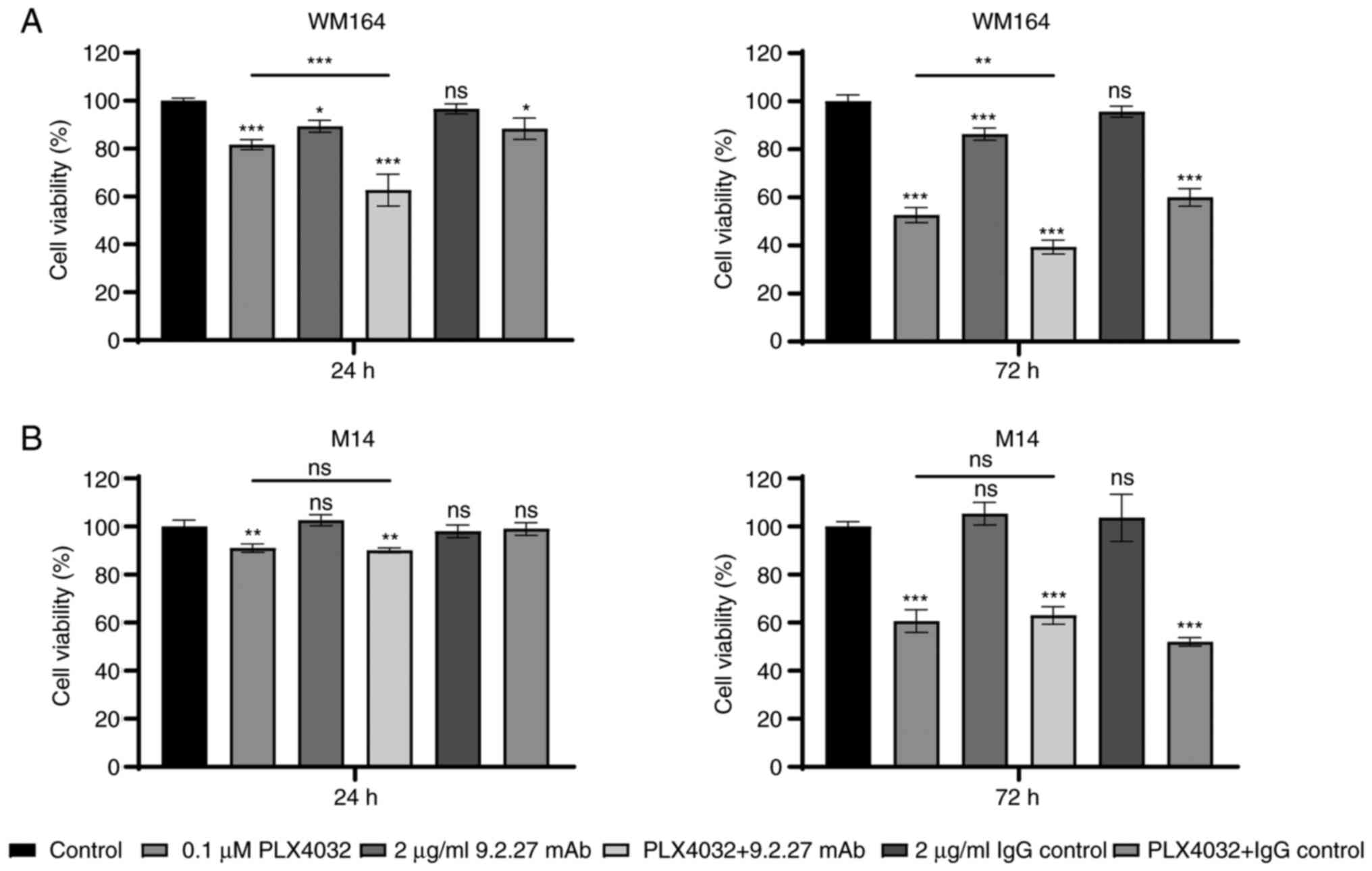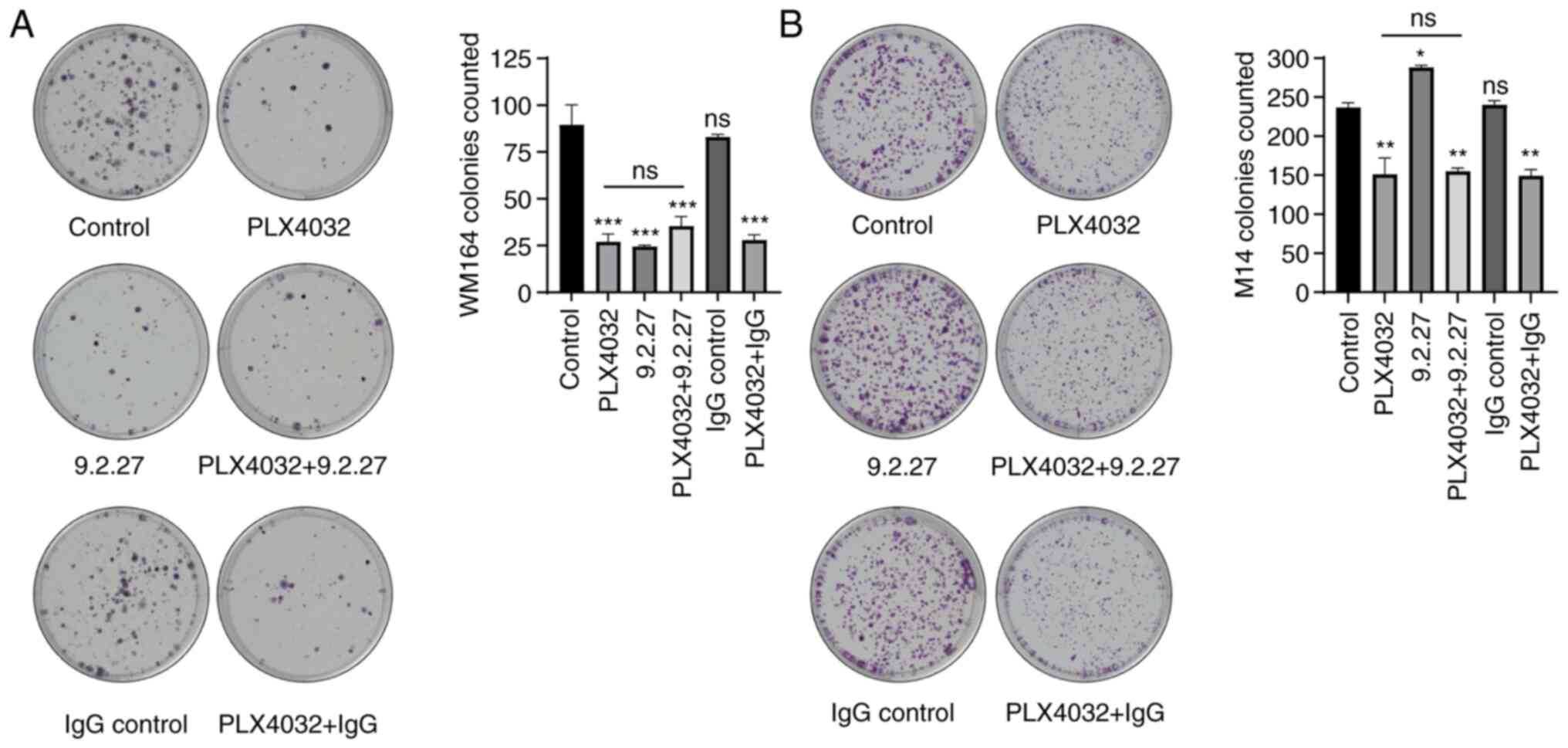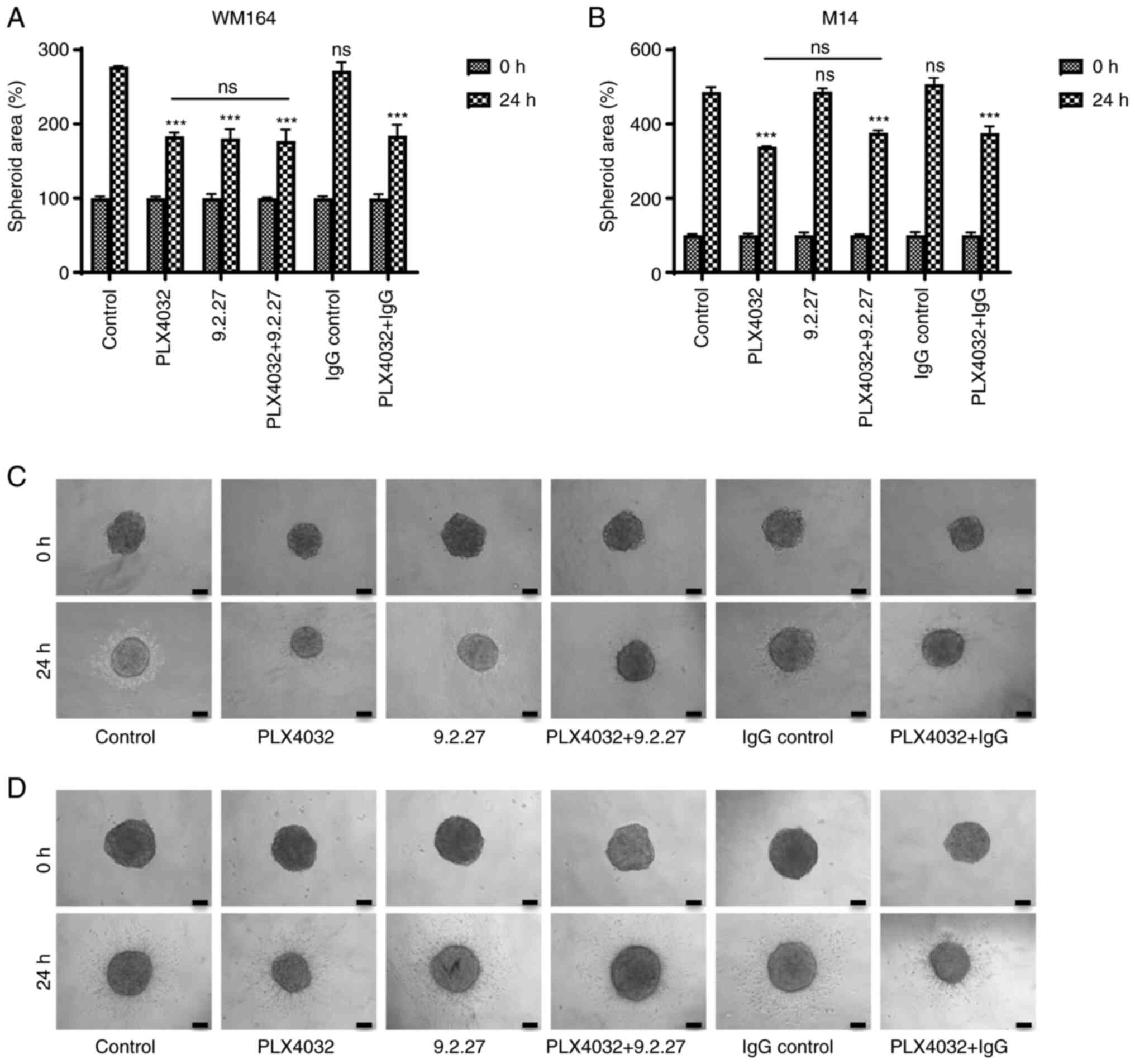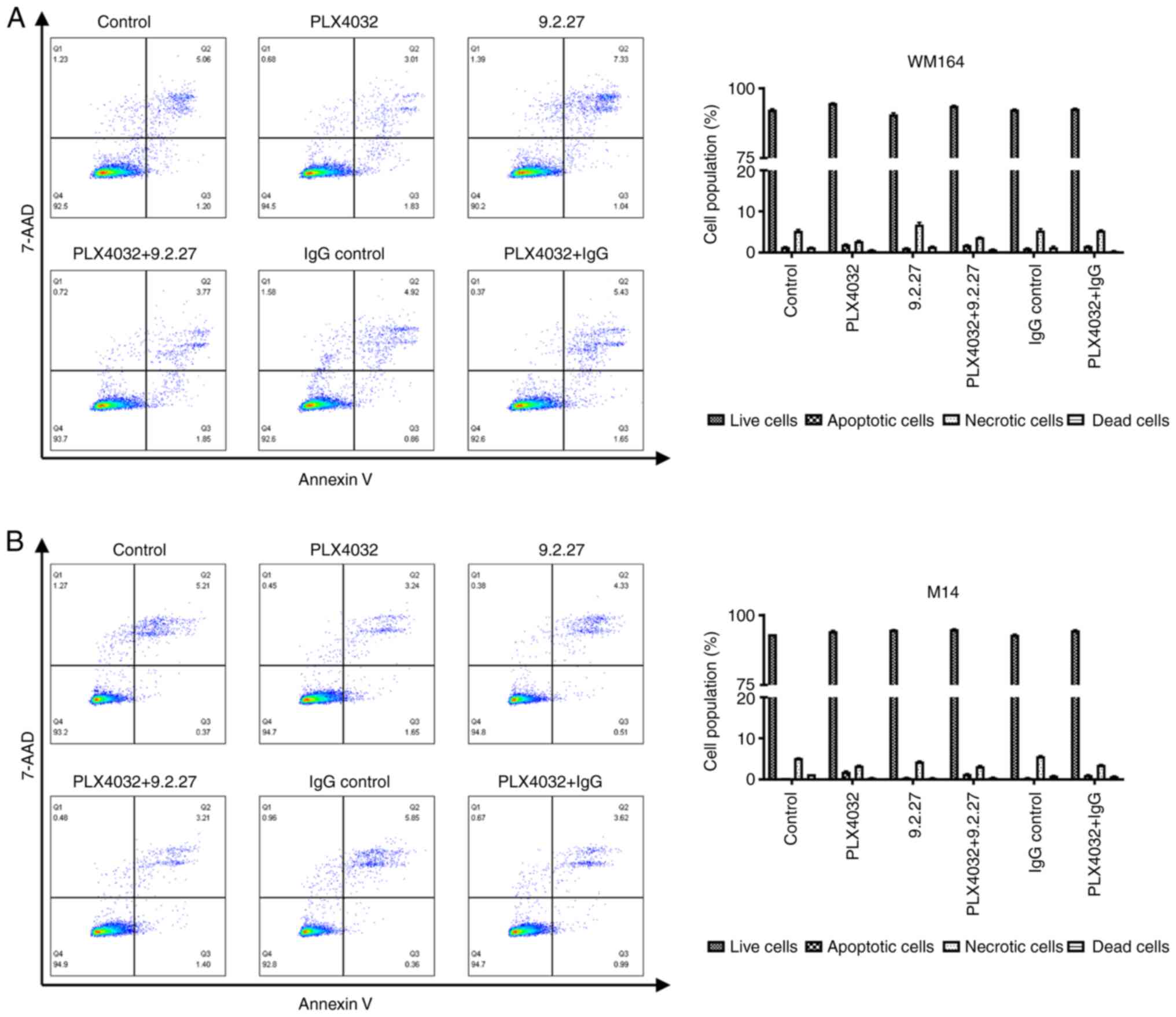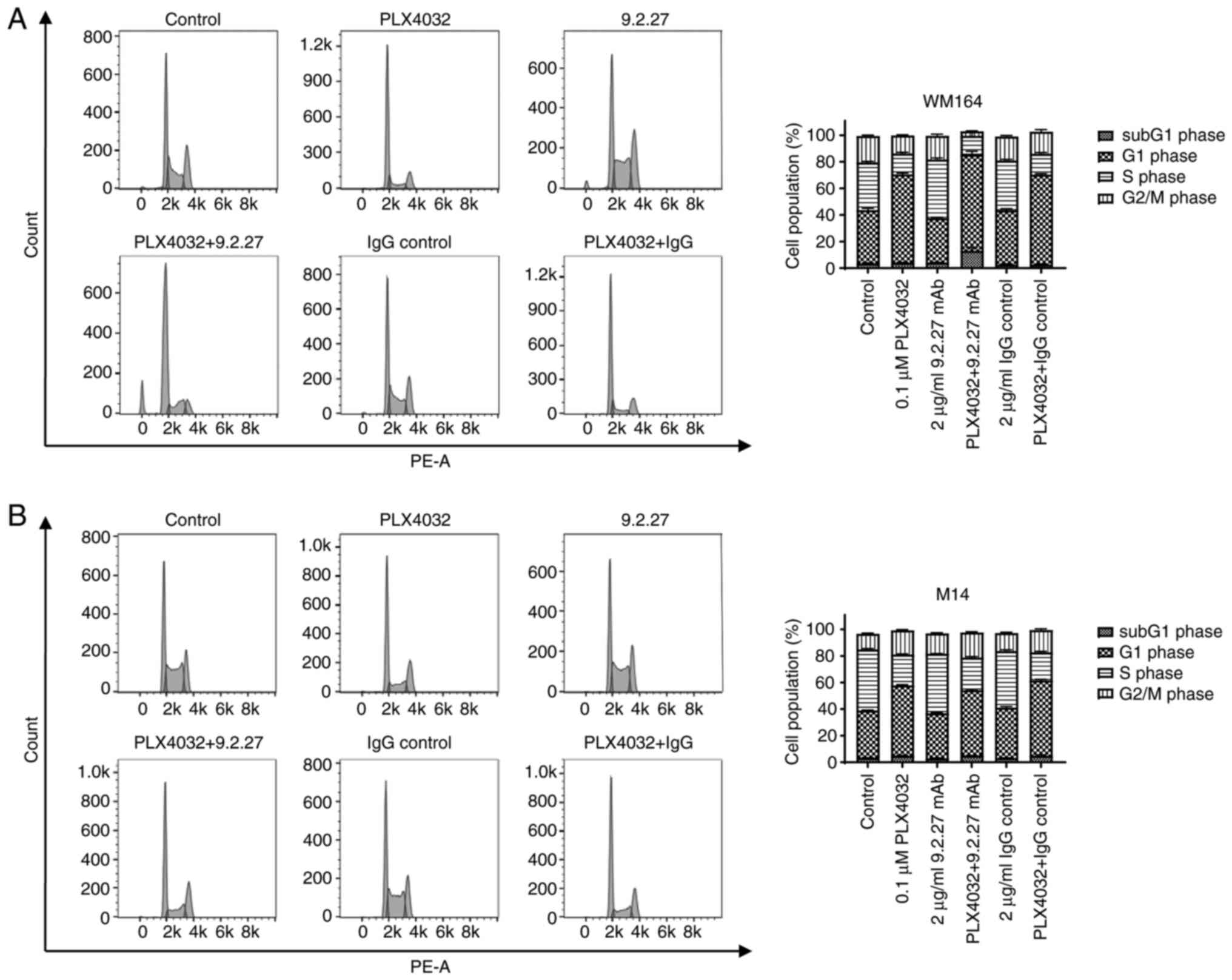|
1
|
Wilson BS, Imai K, Natali PG and Ferrone
S: Distribution and molecular characterization of a cell-surface
and a cytoplasmic antigen detectable in human melanoma cells with
monoclonal antibodies. Int J Cancer. 28:293–300. 1981. View Article : Google Scholar
|
|
2
|
Campoli MR, Chang CC, Kageshita T, Wang X,
McCarthy JB and Ferrone S: Human high molecular
weight-melanoma-associated antigen (HMW-MAA): A melanoma cell
surface chondroitin sulfate proteoglycan (MSCP) with biological and
clinical significance. Crit Rev Immunol. 24:267–296. 2004.
View Article : Google Scholar
|
|
3
|
Campoli M, Ferrone S and Wang X:
Functional and clinical relevance of chondroitin sulfate
proteoglycan 4. Adv Cancer Res. 109:73–121. 2010. View Article : Google Scholar
|
|
4
|
Fenton M, Whiteside TL, Ferrone S and
Boyiadzis M: Chondroitin sulfate proteoglycan-4 (CSPG4)-specific
monoclonal antibody 225.28 in detection of acute myeloid leukemia
blasts. Oncol Res. 22:117–121. 2015. View Article : Google Scholar
|
|
5
|
Warta R, Herold-Mende C, Chaisaingmongkol
J, Popanda O, Mock A, Mogler C, Osswald F, Herpel E, Küstner S,
Eckstein V, et al: Reduced promoter methylation and increased
expression of CSPG4 negatively influences survival of HNSCC
patients. Int J Cancer. 135:2727–2734. 2014. View Article : Google Scholar
|
|
6
|
Wang X, Osada T, Wang Y, Yu L, Sakakura K,
Katayama A, McCarthy JB, Brufsky A, Chivukula M, Khoury T, et al:
CSPG4 protein as a new target for the antibody-based immunotherapy
of triple-negative breast cancer. J Natl Cancer Inst.
102:1496–1512. 2010. View Article : Google Scholar
|
|
7
|
Svendsen A, Verhoeff JJ, Immervoll H,
Brøgger JC, Kmiecik J, Poli A, Netland IA, Prestegarden L,
Planagumà J, Torsvik A, et al: Expression of the progenitor marker
NG2/CSPG4 predicts poor survival and resistance to ionising
radiation in glioblastoma. Acta Neuropathol. 122:495–510. 2011.
View Article : Google Scholar
|
|
8
|
Keleg S, Titov A, Heller A, Giese T,
Tjaden C, Ahmad SS, Gaida MM, Bauer AS, Werner J and Giese NA:
Chondroitin sulfate proteoglycan CSPG4 as a novel hypoxia-sensitive
marker in pancreatic tumors. PLoS One. 9:e1001782014. View Article : Google Scholar
|
|
9
|
Hsu SC, Nadesan P, Puviindran V, Stallcup
WB, Kirsch DG and Alman BA: Effects of chondroitin sulfate
proteoglycan 4 (NG2/CSPG4) on soft-tissue sarcoma growth depend on
tumor developmental stage. J Biol Chem. 293:2466–2475. 2018.
View Article : Google Scholar
|
|
10
|
Rivera Z, Ferrone S, Wang X, Jube S, Yang
H, Pass HI, Kanodia S, Gaudino G and Carbone M: CSPG4 as a target
of antibody-based immunotherapy for malignant mesothelioma. Clin
Cancer Res. 18:5352–5363. 2012. View Article : Google Scholar
|
|
11
|
Price MA, Colvin Wanshura LE, Yang J,
Carlson J, Xiang B, Li G, Ferrone S, Dudek AZ, Turley EA and
McCarthy JB: CSPG4, a potential therapeutic target, facilitates
malignant progression of melanoma. Pigment Cell Melanoma Res.
24:1148–1157. 2011. View Article : Google Scholar
|
|
12
|
Yang J, Price MA, Neudauer CL, Wilson C,
Ferrone S, Xia H, Iida J, Simpson MA and McCarthy JB: Melanoma
chondroitin sulfate proteoglycan enhances FAK and ERK activation by
distinct mechanisms. J Cell Biol. 165:881–891. 2004. View Article : Google Scholar
|
|
13
|
Ilieva KM, Cheung A, Mele S, Chiaruttini
G, Crescioli S, Griffin M, Nakamura M, Spicer JF, Tsoka S, Lacy KE,
et al: Chondroitin sulfate proteoglycan 4 and its potential as an
antibody immunotherapy target across different tumor types. Front
Immunol. 8:19112017. View Article : Google Scholar
|
|
14
|
Rolih V, Barutello G, Iussich S, De Maria
R, Quaglino E, Buracco P, Cavallo F and Riccardo F: CSPG4: A
prototype oncoantigen for translational immunotherapy studies. J
Transl Med. 15:1512017. View Article : Google Scholar
|
|
15
|
Bumol TF, Wang QC, Reisfeld RA and Kaplan
NO: Monoclonal antibody and an antibody-toxin conjugate to a cell
surface proteoglycan of melanoma cells suppress in vivo tumor
growth. Proc Natl Acad Sci USA. 80:529–533. 1983. View Article : Google Scholar
|
|
16
|
Jordaan S, Chetty S, Mungra N, Koopmans I,
van Bommel PE, Helfrich W and Barth S: CSPG4: A target for
selective delivery of human cytolytic fusion proteins and TRAIL.
Biomedicines. 5:372017. View Article : Google Scholar
|
|
17
|
Abbas Rizvi SM, Sarkar S, Goozee G and
Allen BJ: Radioimmunoconjugates for targeted alpha therapy of
malignant melanoma. Melanoma Res. 10:281–289. 2000. View Article : Google Scholar
|
|
18
|
Risberg K, Fodstad O and Andersson Y: The
melanoma specific 9227PE immunotoxin efficiently kills melanoma
cells in vitro. Int J Cancer. 125:23–33. 2009. View Article : Google Scholar
|
|
19
|
de Bruyn M, Rybczynska AA, Wei Y,
Schwenkert M, Fey GH, Dierckx RA, van Waarde A, Helfrich W and
Bremer E: Melanoma-associated Chondroitin Sulfate Proteoglycan
(MCSP)-targeted delivery of soluble TRAIL potently inhibits
melanoma outgrowth in vitro and in vivo. Mol Cancer. 9:3012010.
View Article : Google Scholar
|
|
20
|
Amoury M, Mladenov R, Nachreiner T, Pham
AT, Hristodorov D, Di Fiore S, Helfrich W, Pardo A, Fey G,
Schwenkert M, et al: A novel approach for targeted elimination of
CSPG4-positive triple-negative breast cancer cells using a MAP
tau-based fusion protein. Int J Cancer. 139:916–927. 2016.
View Article : Google Scholar
|
|
21
|
Poli A, Wang J, Domingues O, Planagumà J,
Yan T, Rygh CB, Skaftnesmo KO, Thorsen F, McCormack E, Hentges F,
et al: Targeting glioblastoma with NK cells and mAb against
NG2/CSPG4 prolongs animal survival. Oncotarget. 4:1527–1546. 2013.
View Article : Google Scholar
|
|
22
|
Chapman PB, Hauschild A, Robert C, Haanen
JB, Ascierto P, Larkin J, Dummer R, Garbe C, Testori A, Maio M, et
al: Improved survival with vemurafenib in melanoma with BRAF V600E
mutation. N Engl J Med. 364:2507–2516. 2011. View Article : Google Scholar
|
|
23
|
Proietti I, Skroza N, Michelini S, Mambrin
A, Balduzzi V, Bernardini N, Marchesiello A, Tolino E, Volpe S,
Maddalena P, et al: BRAF Inhibitors: Molecular targeting and
immunomodulatory actions. Cancers (Basel). 12:18232020. View Article : Google Scholar
|
|
24
|
Patel H, Yacoub N, Mishra R, White A, Long
Y, Alanazi S and Garrett JT: Current advances in the treatment of
BRAF-mutant melanoma. Cancers (Basel). 12:4822020. View Article : Google Scholar
|
|
25
|
Yu L, Favoino E, Wang Y, Ma Y, Deng X and
Wang X: The CSPG4-specific monoclonal antibody enhances and
prolongs the effects of the BRAF inhibitor in melanoma cells.
Immunol Res. 50:294–302. 2011. View Article : Google Scholar
|
|
26
|
Pucciarelli D, Lengger N, Takacova M,
Csaderova L, Bartosova M, Breiteneder H, Pastorekova S and Hafner
C: Anti-chondroitin sulfate proteoglycan 4-specific antibodies
modify the effects of vemurafenib on melanoma cells differentially
in normoxia and hypoxia. Int J Oncol. 47:81–90. 2015. View Article : Google Scholar
|
|
27
|
Costa EC, Moreira AF, de Melo-Diogo D,
Gaspar VM, Carvalho MP and Correia IJ: 3D tumor spheroids: An
overview on the tools and techniques used for their analysis.
Biotechnol Adv. 34:1427–1441. 2016. View Article : Google Scholar
|
|
28
|
Bialkowska K, Komorowski P, Bryszewska M
and Milowska K: Spheroids as a type of three-dimensional cell
cultures-examples of methods of preparation and the most important
application. Int J Mol Sci. 21:62252020. View Article : Google Scholar
|
|
29
|
Pampaloni F, Reynaud EG and Stelzer EH:
The third dimension bridges the gap between cell culture and live
tissue. Nat Rev Mol Cell Biol. 8:839–845. 2007. View Article : Google Scholar
|
|
30
|
Beaumont KA, Mohana-Kumaran N and Haass
NK: Modeling melanoma in vitro and in vivo. Healthcare (Basel).
2:27–46. 2013. View Article : Google Scholar
|
|
31
|
Tsai J, Lee JT, Wang W, Zhang J, Cho H,
Mamo S, Bremer R, Gillette S, Kong J, Haass NK, et al: Discovery of
a selective inhibitor of oncogenic B-Raf kinase with potent
antimelanoma activity. Proc Natl Acad Sci USA. 105:3041–3046. 2008.
View Article : Google Scholar
|
|
32
|
Lee JT, Li L, Brafford PA, van den Eijnden
M, Halloran MB, Sproesser K, Haass NK, Smalley KS, Tsai J, Bollag G
and Herlyn M: PLX4032, a potent inhibitor of the B-Raf V600E
oncogene, selectively inhibits V600E-positive melanomas. Pigment
Cell Melanoma Res. 23:820–827. 2010. View Article : Google Scholar
|
|
33
|
Smalley KS, Haass NK, Brafford PA, Lioni
M, Flaherty KT and Herlyn M: Multiple signaling pathways must be
targeted to overcome drug resistance in cell lines derived from
melanoma metastases. Mol Cancer Ther. 5:1136–1144. 2006. View Article : Google Scholar
|
|
34
|
Haass NK, Sproesser K, Nguyen TK,
Contractor R, Medina CA, Nathanson KL, Herlyn M and Smalley KS: The
mitogen-activated protein/extracellular signal-regulated kinase
kinase inhibitor AZD6244 (ARRY-142886) induces growth arrest in
melanoma cells and tumor regression when combined with docetaxel.
Clin Cancer Res. 14:230–239. 2008. View Article : Google Scholar
|
|
35
|
Hafner C, Breiteneder H, Ferrone S,
Thallinger C, Wagner S, Schmidt WM, Jasinska J, Kundi M, Wolff K,
Zielinski CC, et al: Suppression of human melanoma tumor growth in
SCID mice by a human high molecular weight-melanoma associated
antigen (HMW-MAA) specific monoclonal antibody. Int J Cancer.
114:426–432. 2005. View Article : Google Scholar
|
|
36
|
Uranowska K, Kalic T, Valtsanidis V,
Kitzwogerer M, Breiteneder H and Hafner C: Expression of
chondroitin sulfate proteoglycan 4 (CSPG4) in melanoma cells is
downregulated upon inhibition of BRAF. Oncol Rep. 45:142021.
View Article : Google Scholar
|
|
37
|
Schadendorf D, van Akkooi ACJ, Berking C,
Griewank KG, Gutzmer R, Hauschild A, Stang A, Roesch A and Ugurel
S: Melanoma. Lancet. 392:971–984. 2018. View Article : Google Scholar
|
|
38
|
Kimiz-Gebologlu I, Gulce-Iz S and
Biray-Avci C: Monoclonal antibodies in cancer immunotherapy. Mol
Biol Rep. 45:2935–2940. 2018. View Article : Google Scholar
|
|
39
|
Gutzmer R, Stroyakovskiy D, Gogas H,
Robert C, Lewis K, Protsenko S, Pereira RP, Eigentler T, Rutkowski
P, Demidov L, et al: Atezolizumab, vemurafenib, and cobimetinib as
first-line treatment for unresectable advanced BRAFV600
mutation-positive melanoma (IMspire150): Primary analysis of the
randomised, double-blind, placebo-controlled, phase 3 trial.
Lancet. 395:1835–1844. 2020. View Article : Google Scholar
|
|
40
|
Iida J, Wilhelmson KL, Ng J, Lee P,
Morrison C, Tam E, Overall CM and McCarthy JB: Cell surface
chondroitin sulfate glycosaminoglycan in melanoma: Role in the
activation of pro-MMP-2 (pro-gelatinase A). Biochem J. 403:553–563.
2007. View Article : Google Scholar
|
|
41
|
Tang F, Lord MS, Stallcup WB and Whitelock
JM: Cell surface chondroitin sulphate proteoglycan 4 (CSPG4) binds
to the basement membrane heparan sulphate proteoglycan, perlecan,
and is involved in cell adhesion. J Biochem. 163:399–412. 2018.
View Article : Google Scholar
|
|
42
|
Sondergaard JN, Nazarian R, Wang Q, Guo D,
Hsueh T, Mok S, Sazegar H, MacConaill LE, Barretina JG, Kehoe SM,
et al: Differential sensitivity of melanoma cell lines with
BRAFV600E mutation to the specific Raf inhibitor PLX4032. J Transl
Med. 8:392010. View Article : Google Scholar
|















